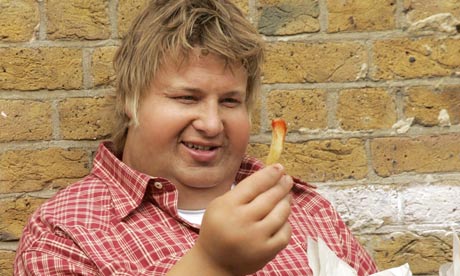
Levels of obesity across the globe are reaching epidemic proportions, according to medical experts. Now the crisis is to be the focus of a major debate at a UN medical conference in New York.
A coalition of nutrition and health experts – ranging from celebrity chef Jamie Oliver to former government chief scientist Sir David King – are urging western nations to play a key role in halting the dramatic rise in numbers of obese people across the planet.
"There seems to be a trend with developing countries wanting to follow in the footsteps of the western world, and copy their patterns of fast food and consumerism," Oliver told the One Young World conference in Switzerland on Friday. The phenomenon was a particular problem in India, South America and the Middle East, he said. Oliver added: "Pre-packed convenience food is seen as a symbol of being 'modern' in developing countries, but the problems it causes are long-term, and costly." "Diet-related diseases are two of the top five causes of premature death for people under 60 years old. They look set to create an absolute catastrophe over the next 30 to 40 years if nothing changes."
Oliver's aim is to encourage heads of state and the UN secretary-general, Ban Ki-moon, to "sit up and take notice" at a summit on non-communicable disease in New York on 20 September. He called for a "global movement to make obesity a human rights issue" and urged a million people to sign a petition. Oliver also urged countries to hold on to their national dishes, and for recipes to pass from generation to generation, saying: "I believe that together we can make some real noise ahead of this meeting of experts."
The attempt to generate a global debate on the crisis is backed by King, who wrote in the Lancet recently: "We need changes in many aspects of our environment to avoid the morbid consequences of overweight and obesity. This change will require global political leadership across public policy, considerably broader than that of health policy, and far better monitoring."
King also called for the issue to be a major focus for debate at the UN summit. "By 2050, 60% of men and 50% of women could be clinically obese," he wrote. "Without action, obesity-related diseases will cost the UK £45bn a year. Research and action should therefore be undertaken to avoid what could develop into a massive problem, not just for the UK, but also globally."
The danger posed by rising obesity numbers has been highlighted by the World Health Organisation (WHO). "It is not uncommon to find under-nutrition and obesity existing side-by-side within the same country, within the same community, and the same household," it states. According to WHO, 65% of the world's population now lives in countries where overweight and obesity kills more people than underweight. However, it is the latter problem that attracts the headlines because it poses an immediate and life-threatening danger.
"With our western-style diets, our biggest problems are a direct result of what the experts call 'bad feeding' – which basically means eating a load of rubbish, highly processed food that's jammed full of salt, fats, sugars, additives, and cheap processed meats," Oliver said. "Governments around the world like it when food is cheap and shops are full, but they're achieving this by allowing big businesses to pump out this sort of food and drink in mass volumes."
Several factors are blamed on the rise of obesity: these include an increase in car use, shifts away from manual labour, the rise in urban living and the availability of cheap, high-calorie convenience foods.King stressed that the current obesity epidemic was not caused by people being lazy or overeating and highlighted previous research which showed that individuals had much less choice in the matter of their weight than they would assume.
"Our biology has stepped out of kilter with society," he said. "Most adults in the UK are already overweight and modern living ensures every generation is heavier than the last. This is known as passive obesity."

